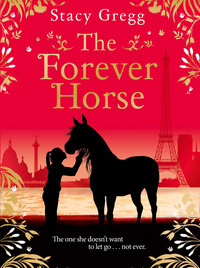
The Stacy Gregg 3-book Horse Collection: Volume 1
Grace strokes her hair, then tucks Doll tightly into bed beside her. “Go to sleep. I will be in the room next door with Ali.”
Haya squirms about to get comfy, wrestling with Doll beneath the blankets. She cannot sleep. The wind is howling now. Outside her window the palm trees are being shaken like rag dolls.
In the blackness of her bedroom, Haya clutches on to Doll. Fresh thunder rolls across the heavens and she is just about to call out for Grace when she hears the sound of voices, coming from downstairs. They are home!
Grasping Doll by the arm, Haya swings her legs over the side of the bed and scampers across the landing.
As she comes down the stairs, she can see her father. He is home and he has company. The King is speaking to a man in uniform, one of the Royal Staff. The man has his head bowed as he hands an object to her father, something small and shiny.
“Baba!”
Haya dashes down the staircase. The King turns to see the little princess in her pyjamas, clutching a dolly with a pink hat, and that is when Haya realises with shock that he is crying.
Haya has never seen her father cry before. He weeps openly, letting the tears run down his cheeks without trying to wipe them away.
“Haya.” Her Baba picks her up and his arms feel strong and safe around her. “It’s OK …”
Haya hugs him tight and buries her face in his chest, but as she does so, she catches a glimpse of the object that he cradles in his right hand. The small and shiny thing that the man passed to him. Haya can see now what it is.
The shattered remains of her Mama’s wristwatch.

Baba cradles Haya as she sobs. She cries so hard, the tears threaten to choke her and she cannot breathe. She clings to Baba, and his arms are strong as he holds her tight and close, and yet it is not enough to comfort her. She wants her Mama. But her Mama is not coming home. Not tonight. Not ever again.
This is what Baba has told Haya. He said that Mama was very brave to go to Tafilah, knowing that the storm was coming. She helped the people in the hospital, gave them blankets and medicine and food. The skies were black when they left the hospital, but the pilot hoped they might outrun the thunderclouds. They were high above the desert on the outskirts of Amman when the storm caught up to them and lightning struck the helicopter.
That night Haya does not leave her Baba’s side. Even when Baba has to go on the radio and tell the whole country that the Queen has died, he keeps her close to him. She sits on his lap as he writes the words that he will say to the nation. When he speaks on the radio, a soft, fuzzy noise can be heard in the background. It is the sound of Ali’s breath drawing in and out as he dozes peacefully in the King’s arms.
That night Haya sleeps with Ali in the big bed with Baba. When she wakes up, the storm is gone. And so is Mama.
At first, she does not truly believe it. Any moment now, Haya expects Mama to walk in, with her arms open wide, her voice lilting and musical as she calls out Haya’s name.
She will come back, Haya thinks. She cannot really be gone.
But there is no Mama at breakfast or to brush her hair or choose her clothes, and Ali will not stop crying. He cries because he does not understand why Mama won’t come to him.
“Shhh, Ali, it’s me. I am here.” Haya lowers the rail on the cot and climbs in beside her brother. Ali’s tiny face is streaked with tears and his little hands clutch tightly on to his blanket. Haya lies down with him and holds him until he stops crying.
By dinnertime, Haya has decided that it is all her fault. She is the reason that Mama is gone, but it is OK because she can fix it. That night, when her meal is served, she eats all her meat. She almost gags as she chews the steak, but she cleans her plate and she is pleased with herself. That will do the trick. Now Mama will come back.
But the meat doesn’t work. And even the next night when she eats her meat all up again, plus Brussels sprouts as well, there is still no Mama. Haya is beginning to think that no matter how much meat she eats, Mama will not come home. By the third night, Haya pushes her plate aside and stares at the steak as if it now silently carries the blame. She will never eat it again.
Every night Baba stays at her bedside and strokes her hair until she sleeps, but he cannot stop the nightmares that wake her, leaving her alone in the darkness, sobbing. They are nightmares about her Mama in the storm. Haya sees the moment when the lightning struck. Was Mama afraid when she fell from the sky? Did it hurt?
In the first days after the crash the palace was stunned into silence. Now it becomes noisy as the whirl of preparations begin for the state funeral. Dignitaries from across Arabia and around the world come to pay their respects. Haya’s aunts and cousins are so very kind to Haya and Ali; in a strange way it is almost like a party with everyone here together. And then suddenly everyone is gone once more and the palace feels cold and empty without Mama’s laughter.
Haya’s footsteps echo through the corridors. The palace has changed. She tries to bake biscuits like she used to, but it is weird how Ismail never, ever gets cross, even when she is in his way. He keeps looking at Haya, his eyes misty, as if he is about to cry. There is so much sorrow here that Haya cannot stand it.
“It’s OK,” Baba says. “I know a place where we can go.”
When the Mercedes arrives, Grace, Haya and Ali pile into the back seat and the King sits upfront with his bodyguard as they cruise out of the palace gates into the grounds of the Royal Compound.
There is a checkpoint at the edge of the compound and their driver pulls over to speak to the guards at the gate. The guards salute and wave them on and very soon they have left the compound and the suburbs of Amman behind them and they are climbing the hills into the forest. The road twists and winds through the pine trees. It is a hot day, but inside the air-conditioned car they are cool.
Grace tries to talk, but Haya turns her head away and stares out at the tree shadows flickering shafts of sunlight on the tinted windows, her thoughts lost in the woods. She has no words left. She does not want to talk, not about anything and especially not about Mama.
At the crest of the hill there is a pair of white posts with bright blue wrought-iron gates. The car turns here and there are tall palm trees bordering the driveway on both sides, and ahead of them the whitewashed buildings of Al Hummar, the Royal Stables.
The stables look like a white Spanish castle, the doors and windows trimmed in bright blue paint. Brilliant red flowers spill out of terracotta pots and purple vines climb the archways that lead through to the stables. There are two courtyards, and in the first of these is a drinking pool with blue painted tiles and a fountain in the middle so the horses can pause in the yard each day to take their fill. The ground around the fountain is hard as rock, baked by the sun and worn smooth by horses’ hooves. The only thing that grows here is an ancient grey-green olive tree, its twisted boughs providing shade in the heat of the day.
Around the edge of both courtyards are the loose boxes, hidden beneath the shade of Spanish arches. And inside the loose boxes are horses.
The horses at Al Hummar are the most beautiful in all of Arabia. To Haya they are enchanted creatures, with silken manes, muzzles soft as velvet and dark eyes that can see into her soul.
There are fifty horses here and all are pure-bred Arabian. Santi is in charge of Al Hummar. His real name is Mr Santiago Lopez and he built these stables for Haya’s father, modelling them on his own back home in Spain. There is always music pouring out of Santi’s office in the first courtyard. “It makes the horses want to dance,” Santi says and Haya is not sure whether to believe him or not.
Titch. That is what Santi calls her and now he says, “Ah, Titch, thank goodness you have arrived. The horses have been asking me all morning when you would come!”
Haya does not say a word, but Santi is undaunted by her silence.
“You talk too much, Titch!” he tells her. “Be quiet, little one, you will scare the horses with all your noise!”
And Haya cannot help but smile just a little bit. Santi does not fuss over her the way they do at the palace. He does not look at her as if she is an object of pity. He leaves her to roam the stable yards as he talks with the King while Grace sits in the sunshine with Ali asleep, cradled in her arms.
Santi always has a pot of hot cardamom coffee on the hotplate beside his desk. He pours a cup for the King and Grace and puts the needle down on the record player, the strains of Spanish music filling the courtyard.
They sit outside the office and watch the young fillies gather at the water trough like a group of girls sharing secrets. When these fillies with their slender, dainty legs like ballerinas grow up, the rose-grey dapples on their rumps will fade and they will be pure white, like their mothers who stand in the shade of the loose boxes watching over them.
The mares, fillies, colts and stallions all live together. Haya knows most of them by name and she makes her rounds to say hello. She is too little to look over the doors, so she has to climb up to see inside the loose boxes, hanging on to the wooden rails as she pays each horse a visit.
Of course she has her favourites. There is the chestnut mare Jamila who looks like a seahorse with flared nostrils and a wide forehead. Jamila has a pretty white blaze and a golden mane that hangs down all the way past her shoulders. She has won many ribbons and rosettes because of her beauty. Beside Jamila is Bahar, an elegant, freckled grey stallion with enormous brown eyes rimmed with long black lashes that flutter like a movie star. Bahar is aloof, he does not always want to say hello, but Haya persists, holding out a handful of alfalfa until he finally deigns to take it from her.
The last box that Haya visits is that of her most favourite of all, a mare named Amina.
Amina’s box is down the driveway in the second courtyard. She is a bay mare, with a deep red coat and lustrous jet-black mane. Black stockings run up her legs all the way to her hocks.
Most Arabians have delicate muzzles, but Amina’s nose is not so pretty. She is a Desert Born Arab, with coarser features, a flatter profile and heavier jaw. Amina is built to jump. She is one of the best jumpers in the stables; fast and fearless.
Whenever Haya comes to the stables, she always asks Santi if she can ride her and he always shakes his head saying, “Amina is powerful and highly-strung, too much horse for a little Titch like you.”
“I’m not little,” Haya tries to argue.
But Santi is firm. “You can have a lesson on Dandy,” he says.
Haya doesn’t want Dandy. He is an ill-tempered Shetland gelding with short legs and a bushy mane. He is so little Haya can brush him without using the orange crate to stand on. He tries to bite her when she brushes his flank. He is not the horse for her.
*
One day they visit Al Hummar, just Haya, Grace and Ali. Haya has been coming here every week since Mama died and now she is almost four. Santi is there at the gates as always to welcome them and takes Grace to his office and pours her a coffee while Ali pulls out a record to hand to Santi and Haya takes herself off to visit the horses.
Today she makes her way directly to the second courtyard to see Amina.
Amina’s head is already poking out over the loose-box door, her dainty ears swivelling attentively at the sound of Haya’s approaching footsteps. Santi has left the old orange crate beside Amina’s box for her and Haya props it up against the door, climbing on top of it so that she is tall enough to see inside.
“Amina!”
The mare nickers in reply and nuzzles her. Haya usually feeds the horses with handfuls of alfalfa, but today she has brought Amina something special. She digs into her pocket and pulls out three round white peppermints. Teetering on the orange crate, she extends her hand out flat with the offering and the mare eagerly snuffles her palm, nibbling daintily, brushing her skin with soft lips until all three peppermints have vanished. Haya giggles as Amina’s mouth works furiously, tasting the mints. The mare begins to jiggle her head up and down, her eyes going wide as she chews. Haya’s tiny hands work the bolts on the loose-box door.
Haya climbs up the stable door and this time when she reaches the top rung she throws herself into the air! Amina sidesteps as she feels Haya’s weight land on her back. She gives a snort as Haya begins to tap her with her heels, urging her on like the stone lions at Al Nadwa.
Amina is not cold like the stone lions; her body feels warm between Haya’s bare legs. Haya taps again with her heels and pulls on the guide rope she has strung round Amina’s neck and they set off up the driveway towards the main courtyard.
As they enter the courtyard, other horses stick their heads out over the stable doors to nicker their greetings. Amina is a confident mare and without a glance at the other horses she walks straight up to the fountain and shoves her muzzle deep into the cool trough. Up on her back, Haya is chatting away to the mare, swinging her legs back and forth as Amina snorts and flicks at the water.
Suddenly the door to Santi’s office flies open. Grace is there, looking very anxious. “Haya!” she cries out. She is about to race towards the fountain when Santi grabs her arm.
“She’s OK,” Haya hears him say. “They have made it this far. The mare will not hurt her. Come back and finish your coffee and leave them both a while longer.”
In the car on the way home Haya is no longer silent. She is full of her adventure, already making plans to ride Amina the next time she returns to Al Hummar.
“We shall see,” Grace says, trying to be firm, but so relieved to see the Princess smiling and laughing that she does not say no.
That night, when Baba arrives home, Haya cannot wait to tell him.
“I rode Amina today,” she says as she clambers into bed with Doll under her arm.
Her father raises an eyebrow in surprise. “Did you really?”
“Santi says I am a natural,” Haya says proudly. And then she asks, “What is a natural?”
Baba smiles. “Horses are in your blood, Haya. For many generations the Bedouin have bred the best horses. The Arabians in our stables can be traced back to the first horses, the five mares of Al Khamseh.”
Haya knows the Legend of Al Khamseh. Her father has told it to her lots of times before, but she wants it again. She lies back on the pillow and her father tucks the blankets tight around her before he begins.
“Two thousand years ago your ancestor, Mohammad, Peace Be Upon Him, wanted to create the perfect horse, one with the stamina, speed, courage and loyalty to carry him across the great deserts. So he gathered together a hundred of his very best mares and set a test. For three long days he kept the horses under the hot desert sun, penned without food or drink to test their stamina. Then he released the mares, and let them gallop to the waterhole of a distant oasis.
“The mares galloped on, closer and closer to the oasis. Then, just when they had almost reached the water’s edge, he raised his battle horn to his lips and blew, calling the mares back to him once more.
“Of the hundred mares, only five were courageous and loyal enough to turn round and return to his side. These mares became known as ‘The Five’. Each of them was a different colour – a grey, a black, a roan, a chestnut and a bay. It is said that their noble blood is in the veins of every true Bedouin Arabian.”
“Why was it only mares?” Haya asks. “Weren’t there stallions too?”
“Oh, yes, there were a great many stallions,” her father says. “But to the Bedouin it is the mothers – the mares – who matter the most.”
“Did Mohammad, Peace Be Upon Him, have a favourite mare?” Haya asks.
“They say that he loved the bay best of all,” her father replies.
“Amina is a bay,” Haya says. She is quiet for a moment and then she asks, “Do camels have noble blood?”
Her father smiles again. “Camels are magnificent creatures. Without them, the Bedouin could not have conquered the great desert. But horses are bonded to us, deep in our hearts. In the desert, a Bedouin will leave his camels outside his tent, but his horse sleeps with him inside, kept safe by his bed.”
“I want to do that,” Haya says. “I wish Amina could come here and sleep in my bedroom with me.”
“I think Amina might prefer her loose box,” her father says. “And I don’t think Zuhair would be very pleased to see hoofprints on the carpets.”
The King tucks Haya in more tightly and strokes her hair. “Sleep well, my Bedouin Princess.”
That night, for the first time in ages, Haya does not cry. She lies back on her pillow and stares at the stars, imagining galloping on Amina. She can hear the battle horn and feel the surge of the mare’s speed, as she grips on tight with her legs, spurring Amina forward. Bare skin against silky fur, the coarse rope of the mare’s mane tangled in her hands and Amina’s wonderful, warm, sweet smell filling Haya’s senses as she drifts off to sleep.

One morning at breakfast Haya’s father tells her that Grace is leaving.
“Grace’s mother is very sick,” the King explains, “and there is no one else to care for her. Grace needs to go home.”
Grace’s mother lives a long way from Amman so Grace cannot stay at the palace to look after Haya and Ali.
“Will the new nanny bake biscuits?” Haya asks Grace.
Grace smiles. “I am sure she will.”
“But how will she know how I like them?” Haya asks.
Grace gives Haya a hug and wipes the tears off her hot little cheeks. “Perhaps she will make them differently,” she tells Haya, “but I am sure you will like her biscuits too.”
She cuddles Haya close. “Your new nanny will love you as much as I do,” Grace whispers softly. “Wait and see.”
*
On the day that Grace goes away forever, the King takes Haya and Ali to the Summer House in Aqaba. They set off, just the three of them, in the blue sports car, all alone – except for the bodyguards who travel in two separate cars, one in front and one behind.
They honk and beep their way through the narrow streets of the market district where merchants hang their stalls with colourful rugs and scarves, and soon leave the creamy white apartment blocks of the city behind. Now there are clusters of houses amid bare hills, their flat rooftops trimmed with satellite dishes. Shaggy brown goats wander loose by the roads where camel herders live in tents constructed out of brightly coloured blankets, ignoring the motorways of traffic whizzing by them.
On the open highway horns blast and lorries thunder past the little sports car, but Haya’s father is not flustered, weaving and zipping in between them. At one point he overtakes his bodyguards and Haya looks back through the rear window to see the two black Mercedes struggling to keep up as her father takes the bends at top speed.
The roads climb higher until they finally crest the ridge and see desert mountains stretching out to the horizon. The mountains are the colour of rust, but the soil beside the road is chalky pale and the only plants that grow here are thorn bushes.
Haya can feel her ears about to pop as they descend the mountain roads to a flat stretch of highway that goes all the way to Aqaba, where desert sand at last meets sea.
The Summer House is very simple compared to their palace, sunny and bright with a view over the sea and doors that open out on to the beach. Haya remembers summer days spent here, always in her swimming costume with her feet covered in sand.
The members of the King’s Guard have arrived ahead of them to check that everything is as it should be, and the housekeeper and chef are preparing lunch. Haya and Ali just have time for a swim before the food is ready. It is a feast of ripe tomatoes and hummus and baba ghanoush and tabbouleh, and a dish called upside down, made with aubergines. Haya shows her father shells that she found on the beach after her swim. Her favourite is a white one shaped in a twist like an ice-cream cone.
In the afternoon, Haya takes Ali for a walk in the garden and holds him up to grasp the oranges that grow there and pluck them from the trees.
As she walks back into the kitchen with her arms full of oranges, Haya is about to call out for Mama, expecting her to be here waiting for her, just like she used to be. Then the words choke in her throat as she remembers all of a sudden and the oranges tumble to the floor.
On the drive home the next day Haya is silent. She stares out of the window while her father tells her about Frances. She will be Haya’s new nanny and is arriving tomorrow.
“Frances will live with us just like Grace did,” her father explains.
Haya has never had a new nanny. She keeps looking out of the window as her father tells her how wonderful Frances will be. Haya can taste her tears, salty like the waves at Aqaba.
*
“There she is, Ali, you see?” Haya lifts her little brother up to the window so that he can see Frances getting out of her car and walking to the front door. “That’s her,” Haya tells him. “She’s going to be really nice and love us like Grace did. Grace promised.”
All Haya can see is the top of her head, the auburn hair twisted up into a sleekly groomed beehive. Frances is wearing a navy blue cotton piqué dress and the stiff pleats of her skirt stick out around her. As she walks up the front steps, the two stone lions on either side of the door don’t move. They wouldn’t bother to eat you, Haya thinks. Frances looks very bony, not enough meat for them.
The King is very lucky to have secured Frances’s services at such short notice. Frances has, until recently, been in the service of a family in Zurich where she mixed with a very international set. She can speak English and French, bien sûr, and a little German, but not Arabic so do not even ask her to try. She has worked for the very best people, the cream of society. Haya knows this because she hears Frances telling Zuhair as she walks down the corridors of Al Nadwa, her sensible heels clacking on the marble floors.
Frances informs Zuhair that she is a governess which is altogether different to a nanny and he will please address her as Miss Ramsmead. She explains how she likes her tea: with milk, no lemon, no sugar. The tea itself needs to be brewed for exactly two minutes, no more, no less, and she would like a cup of it right now, please, brought up to her room.
Haya, who has been listening and watching from the upstairs landing, has to duck hastily into her bedroom as Frances breezes straight upstairs ahead of Zuhair.
After a quick glance round Grace’s old room, she pronounces it “adequate” and tells Zuhair he may fetch her suitcases and the tea now.
Zuhair is not used to being spoken to in this manner. Even the Queen never spoke to him like this. But his face does not show a flicker of expression as he says, “Certainly, Miss Ramsmead,” and heads downstairs to get her bags and explain to the kitchen staff the special requirements of the new governess.
Haya is staring at Frances while she rummages distractedly in her handbag, but suddenly her new governess stops and swivels her head round. The Princess ducks behind the door, but it is too late.
“Good afternoon. You must be Her Royal Highness Princess Haya?”
Haya stays hidden behind the door.
Frances sighs. “It is not good manners for a Princess to greet someone like this,” she says. “The correct thing would be to present yourself as I am doing now. I am Miss Ramsmead, but you may call me Frances if you wish.”









